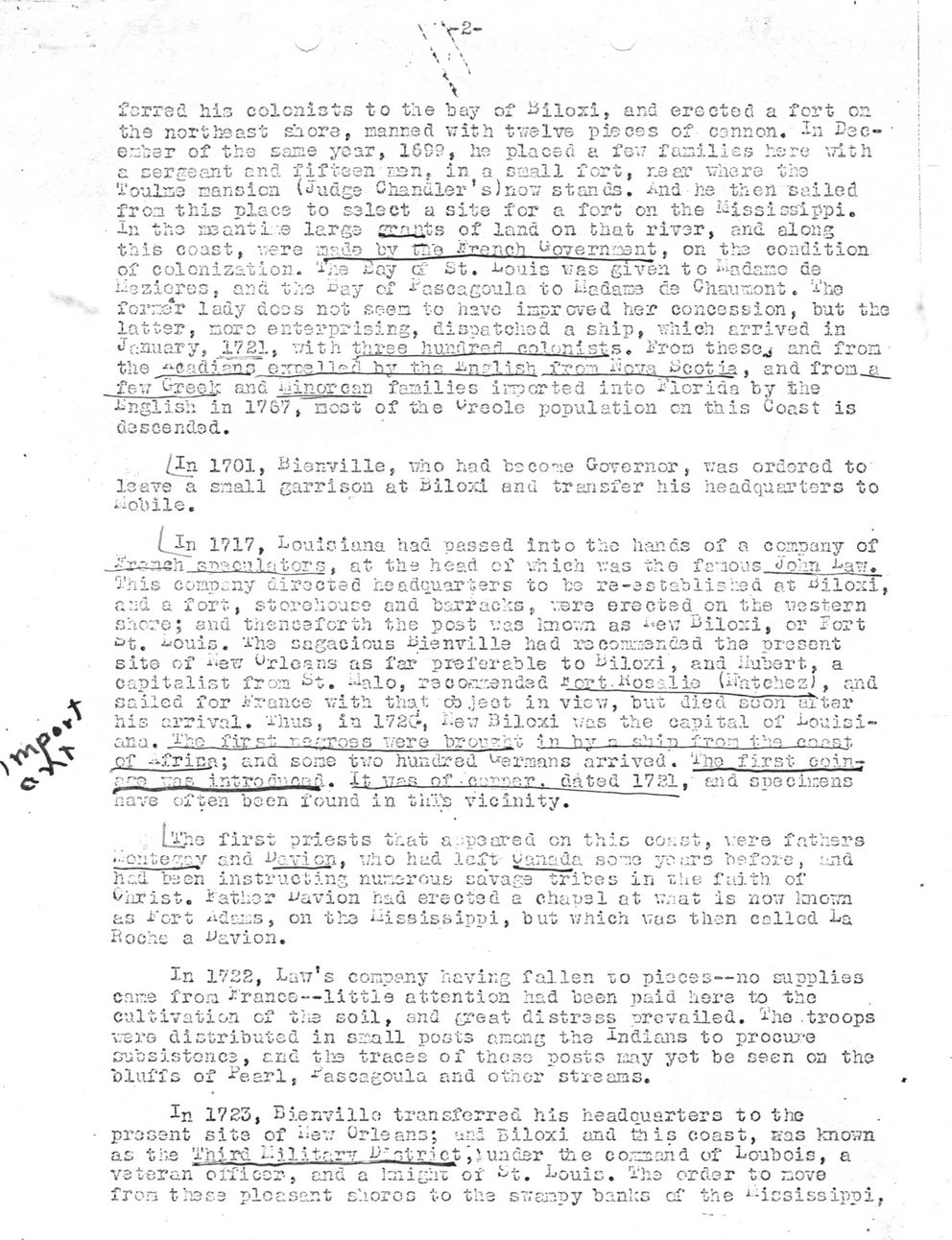This text was obtained via automated optical character recognition.
It has not been edited and may therefore contain several errors.
\ v ' \ < * ferred his colonists to the bay of ^ilori, and erected a fort on the northeast shore, manned with twelve pieces of cennon. In Dec- ' e,"':er of the same year, 1699, ho placed a few families here with a sergeant end fifteen 12 n, in a soall fort, near where the 'i’oulne mansion Uudge Chandler ’ s)no7; stands. And-he then sailed fron this place to select a site for a fort on the Mississippi. -in the asantl'.e large ?ra-p,ts of land on ohat river, and along this coast, were a a do by tTre French ^overnasnt, on the condition of colonization. ‘ii:a i-ay c£ St. i*ouis was given t o ^adarsc de iissiores, and tho cay of Pascagoula to Ha&as3 de Chautnont. 'fh© iorr.sr lady does not seen to have improved her concession, but the latter, nore enterprising, dispatched a ship, v;hich arrived in J ana ar y, JL7 21} wi t h three hirnflr^r? p.Dl.pr^ qf.s. i-’rora these* and fron the_**cad j.gno h-*- t.hp, fro-i l^ova Scotia. and from_&_ fey kreeK and ^ in or can families in? or ted into i-Iorida by the English in 1767, nost of the ^reolo population on this Coast is descended. /In 1701, Bienville, who had bo come Governor} was ordered to leave a snail garrison at biloxi anu transfer his headquarters to Mobile. (^1n 1717, Louisiana had passed into the hands of a company of h s~n?c-.i 1 f 1t or s, at the head of vhich was the fg-aoas John La?j, This conpony directed headquarters to he re-escablished at ^ilosi, and a fort, storehouse and barracks* v.ere erectsdon the western shore; and thenceforth the post vas hnc;vn as ^ew -^iloni, or Tort ^t. ■‘■‘Ouis. ‘i'he sagacious Bienville had reeorx'en&ed the present sit© of -“ew Orleans as far preferable to ^ilozi , and Hubert, a capitalist frora &t. ^alo, recor-T'ended -t?ort• ^osalio (ii'atches) , and sailed for trance with that do.jeot in view, but disclose on after his arrival, 'i'hus, in 1720, i-ew Biloxi ’./as the capital of Louisiana. '^O firr.t r;ri?-:rogs were brought -in hy r. <;V';n f?nn f.-^q cnpFit, of Africa: and some two hundred Germans arrived, ‘i-'he first coin-r^rt wnr. inr.ronv-cr-ifl. It wr^ of - d>ited 17£I, and speciinens nave often been found in thTs vicinity. tThe first priests that appeared on this coast, were fathers ■'■oriue-^j and : vi on. who had left y ana da so'r.e ye ars before, ana had teen instructing numerous sa'vags tribes in the faith of Christ, iather -‘-'avion had erected a chapel at wnat is now laiown as i'crt ^daius, on the Mississippi, but which was then ccllcd La Hoche a -^avion. In 1722, Law’s company having fallen to pieces—no supplies car.e fron francs—little attention had been paid here to the cultivation of tiie soil, and great distress prevailed, -t-'he troops were distributed in sz-all posts among the Indians to procure subsistence, and the traces of those posts nay yet be seen on the bluffs of Pearl, Pascagoula and other streams. In 1723, Bienville transferred his headquarters to the present sits of i»ew Orleans; and Biloxi and this coast, Eas known as ti-e Third ili 1 itarv V:.r,tr5ct1 under the co^and of Loubois, a veteran officer-, and a 1 might of ^t. i-ouis. I'he order to nova fron these pleasant shores to the swanpy banks of the Mississippi,

Hancock County 1 Claiborne-JFH-July-4-1876-address-Joe-Pilet-(043)